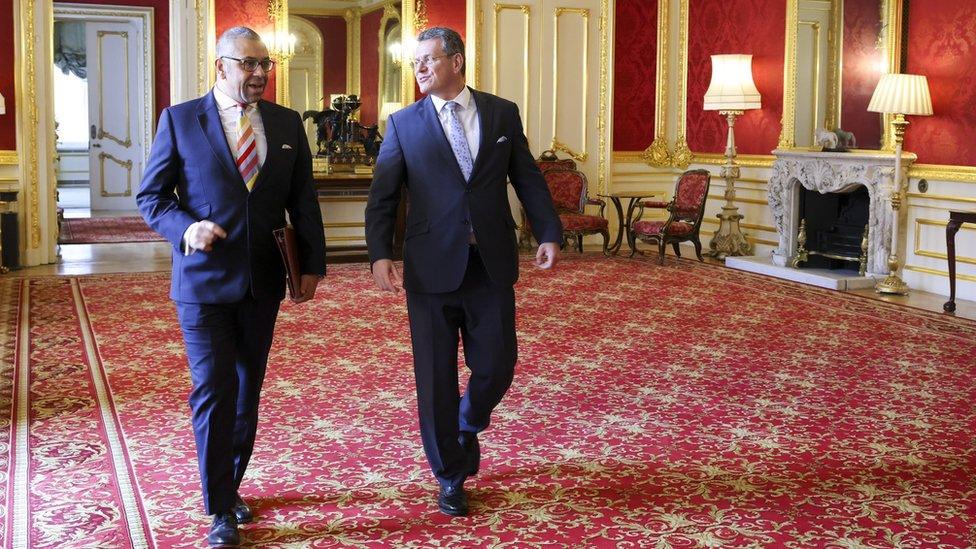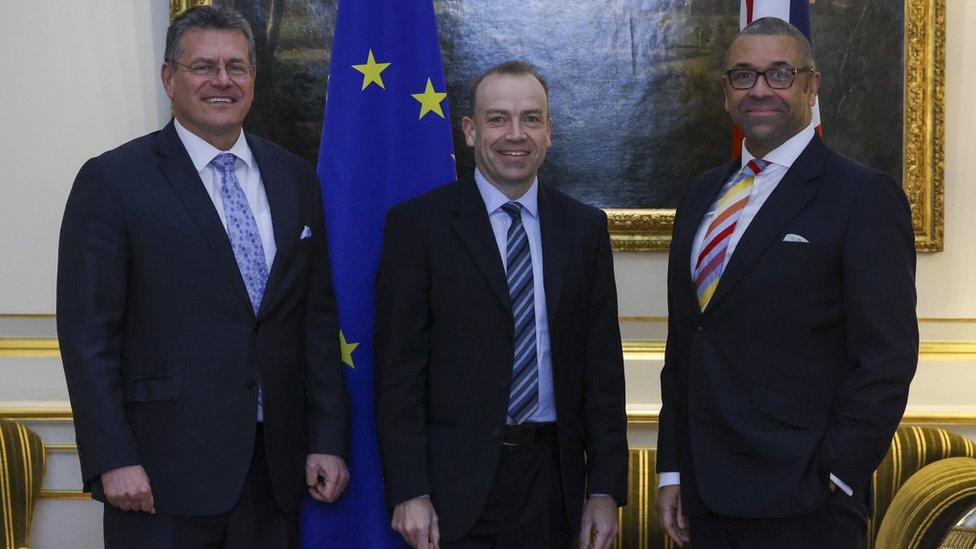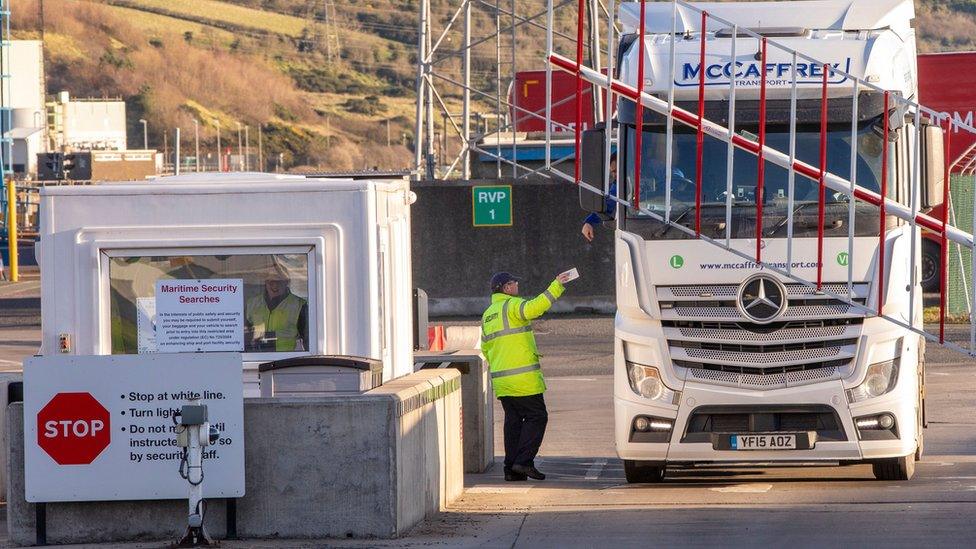NI Protocol: UK and EU reach agreement on trade data sharing
- Published
- comments

James Cleverly and Maros Šefčovič met in London on Monday
The EU and UK say there is a "new basis" for talks on the Northern Ireland Protocol after agreement was reached on sharing trade data.
The agreement will allow the EU to access UK IT systems which will give detailed information about goods flowing from GB to Northern Ireland.
Agreement in this area is seen as a key step to reaching a broader deal.
In a joint statement they said technical teams would now "work rapidly" to find solutions.
The statement came after a meeting between EU chief negotiator Maros Šefčovič, UK Foreign Secretary James Cleverly and Northern Ireland Secretary Chris Heaton-Harris.
The men will meet again next week.
The joint statement said the agreement on trade data was "a critical prerequisite to building trust and providing assurance, and provided a new basis for EU-UK discussions."
After the meeting Mr Cleverly tweeted that he and Mr Šefčovič shared the same focus - "the best outcome for Northern Ireland".
Northern Ireland has not had a fully-functioning government since February 2021, when the Democratic Unionist Party withdrew from the NI Executive as part of its ongoing protest against the protocol.

What is the Northern Ireland Protocol?
The protocol is a part of the UK-EU Brexit deal that keeps Northern Ireland aligned with some EU trade rules.
It keeps Northern Ireland in the EU's single market for goods, avoiding the need for a hard border with the Irish Republic after Brexit.
However, it also creates a new trade border between Northern Ireland and the rest of the UK, something the EU accepts is causing difficulties for many businesses.
Some unionists say it is also undermining Northern Ireland's place in the UK.
The UK says the protocol is not working and plans to override most of the agreement if the EU does not agree to changes.


Northern Ireland Secretary Chris Heaton-Harris (centre) was also at the meeting
One of the changes the UK has proposed is a green lane/red lane system for goods entering Northern Ireland from GB.
Trusted traders would use a green lane for GB goods that are destined only for Northern Ireland, meaning that would not need to be checked and would have minimal paperwork.
Goods destined to travel onwards to the Republic of Ireland would enter via a red lane, where they would be subject to standard EU controls and checks.
The EU accepts that goods which are staying in Northern Ireland should be subject to a lighter touch.
In October 2021 it floated a range of proposals which it said would effectively create an "express lane" to help facilitate the movements of GB goods whose end destination is Northern Ireland.
Both these proposals would require accurate, real time information on GB to Northern Ireland goods for risk management and enforcement purposes.
The UK says it has built a system which can do this by drawing together five different databases which deal with things like customs declarations, safety and security declarations and ferry manifests.
It says the system has been operational since January of last year, but the EU wanted further functionality to be added.
The system was demonstrated to EU officials last summer and has been working in pilot form in recent months.
The EU's acceptance that the system works is significant but it does not mean that a fresh agreement on the movement of goods is inevitable.


So often, following meetings of this kind, the statements to come out of them have been vague and short; maybe no more than 100 words.
Why? Sometimes there just wasn't much to say as talks repeatedly stalled.
Today's statement, however, gives high level political sign-off to a problem that's long been haggled over.
That doesn't mean that everything is solved, but it will help move discussions forward on a technical level - as well as being politically significant.
Remember, last summer the European Commission was moving to sue the UK as the government pursued plans to unilaterally start scrapping parts of the protocol.
The atmosphere has radically improved since then, with Rishi Sunak clearly preferring a more conciliatory approach.
The fact that Brussels and London are now prepared to say, in public, here's something important and specific we agree on shouldn't be underplayed.
In this context, it's been rare.
However any over-arching deal, if we get there, still needs to be sellable to unionists in Northern Ireland as well as the government's own Conservative benches.
There are still plenty of potential pitfalls but things are, finally, moving forward and both sides are clearly trying to give the talks fresh momentum.

A previous stumbling block has been how much information companies need to provide when shipping goods from GB to Northern Ireland, which can be a bigger problem than physical checks.
The EU has previously says it needs technical customs codes for risk assessment purposes, but the UK has said this is too onerous and that straightforward invoice data should suffices.
During the Christmas period the UK said that it will soon bring forward legislation which would lead to the building of new facilities at Northern Ireland's ports to enforce the protocol.
The government said this would be necessary for red lane checks but the lack of proper border controls posts at the ports has long been an EU bugbear.
Related topics
- Published2 February 2024

- Published14 December 2022
